25 Best Places To Go Metal Detecting

Would you like to know our top 25 places to go metal detecting?
As a treasure hunter or one who fancies metal detecting adventures, there are tons of places to use your metal detector to find jewelry, coins, rings, relics, gold, and a list of other types of metals and hidden treasures.
However, you must go to where people worked, lived, played, or visited.
I have compiled a list below of the 25 best places to metal detect around where you live, and they are all hotspots for finding these kinds of valuable metals and treasures.
I hope you enjoy my list of amazing sites to get the most out of your favorite hobby.
1. Your own backyard

Although it might not seem like the most exciting place to put your metal detector to work, your backyard is the perfect place to practice.
If you are not the first person to live there, there is the potential of coming across some valuable metals and treasures lost by the previous owner.
You might even come across an old piece of expensive jewelry you thought you lost in the local market or while out shopping.
2. School Grounds
Old school sites are incredible places to go treasure hunting, but ensure you get permission from the property owner in writing before you start digging around.
It is best if you do historical research of the property to have an idea of where to dig and the kind of objects you may uncover.
You might also want to go metal detecting in current schools to search for modern coins, but be sure to do this during off-school hours or the holidays and don't forget to get permission.
3. Churches

An old church site is a great place to find ancient coins and other forms of treasure lost by previous congregants or during construction.
Current churches host a large number of people and are ideal locations for metal detecting for coins and jewelry lost over time.
However, be sure not to go treasure hunting around graveyards if the churches have them. It is not ethical or moral and people consider this as grave robbing.
4. Picnic sites
Picnic groves such as churches and schools are metal hotspots, especially jewelry. Either way, it might take you a lot of time since litter is common in these sites.
You have to exercise lots of patience as you will continuously dig up cans and bottles.
If you love such a challenge, however, you may be surprised by the number of valuable metal objects you might uncover.
5. Beach

You will never miss people at the beach, which means you might quickly come across treasure and other lost valuables even without using the metal detector.
Here you will find all kinds of objects from ancient coins from various countries, including items of great value once you put your detector to work.
However, be sure to check state laws before the visit to establish where you should and should not go.
6. Campground
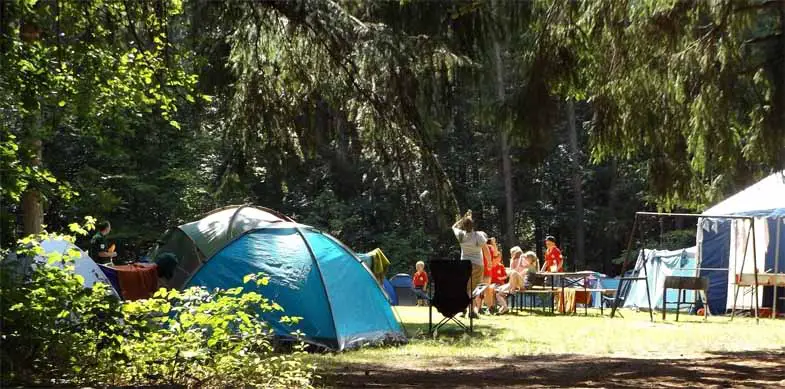
If you are looking to gather a collection of wheat cents from your metal detecting hobby, then the local campground or state park is the place to be.
However, you are still going to come across aluminium cans, bottle caps, and the metal parts of ice cream trucks and trailers, which is why patience and persistence are required.
It is wise, though, that you liaise with the campground management to find out if you are allowed to detect in the campground or park.
7. Shores of a creek
The ocean tides wash all kinds of material from the deep seas to the shore, but the best place to go treasure hunting is on the shores of creeks.
All types of metal lost or thrown overboard by sailors are present at the creek, while there are also metals such as jewelry from the people who play and fish in creeks.
Make sure though that your metal detector has a waterproof coil.
8. Abandoned towns
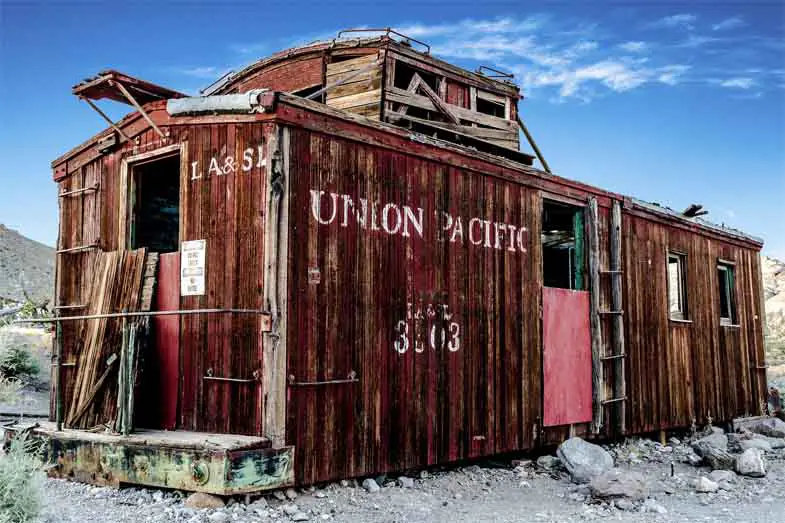
During the ancient times of gold rushes and oil booms, very many small towns emerged quickly and died just as fast.
There is no better place to dig and collect old coins, gold plates if lucky and other forms of hidden treasure like in ghost towns.
Some of these towns are marked as historical sites by the country or state, which means you cannot go hunting there.
Do extensive research and find out those not funded as nonprofit historical sites and seek permission from the relevant authorities.
9. Scouts camp
The majority of scout camps are old historical sites, and they exist in large numbers.
Scout camps for both boy scouts and girl guides are ideal locations to satisfy your metal detecting urge, and the vicinity adds fun to this quest.
However, like most places to go metal detecting around, get in touch with scout leaders and local chapters in the area to get authorization to metal detect in their camps.
10. Bleachers

From the design of bleachers, it is pretty evident that spectators leave behind coins and jewelry.
Under these sports stands is a great spot to collect these valuable objects that have lost.
The ideal time to go metal detecting on and under the bleachers is during offseason when no one is using the fields.
You, however, need to master the art of detecting and digging to avoid destroying the turf.
11. Flea market
Customers in flea and open markets drop coins or other metallic items that you might find interesting and of value to detect and collect.
Getting permission to scout for metals with your detector in the flea market is very easy as contact details for the owners are available online.
Create time during the off-season or on weekdays when the market is closed and hunt without any human interruptions.
12. Fair Ground site
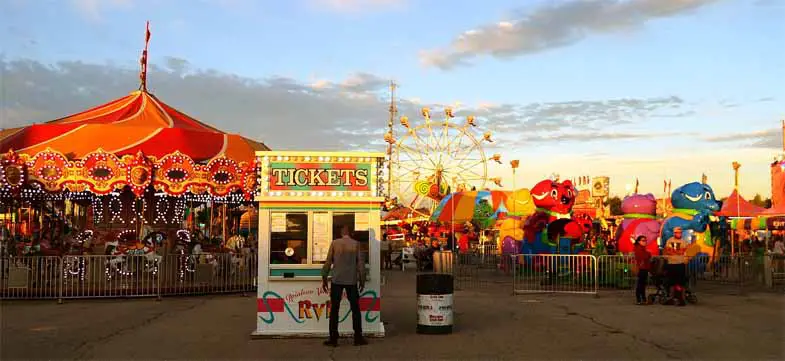
The reason why carnival and fairground sites are part of the 25 best places to metal detect is that they are in use very few times of the year and host lots of people.
You have plenty of time to scavenge the entire site with your metal detector, dig, collect and record coins and jewelry, and, if lucky, some relics depending on what the ground was used for previously.
Authorization to metal detect in the fairground site is offered by the county or local township and must be in writing.
13. Old gas stations
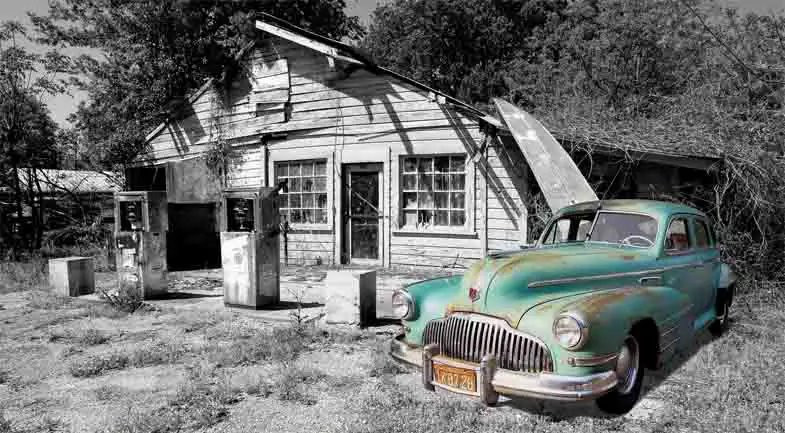
A good number of gas stations have closed for good and are good sources of treasure.
Discover where people have dropped loose change or other valuable objects while shopping of eating fast food.
Once you have acquired permission from the property owner, proceed with caution since there might be buried tanks with fuel or gas or leaks.
You will not be able to dig due to the concrete flooring of most gas stations, which means you only get to detect metals on the surface.
14. Parking lots
You might be amazed by the number of things that people lose in parking lots daily.
Imagine how much you could collect while using your metal detector since even without it, you come across coins, jewelry, and other forms of precious metals.
Any day is D-day for metal detecting at parking lots since they are used all year long.
15. Hiking trails
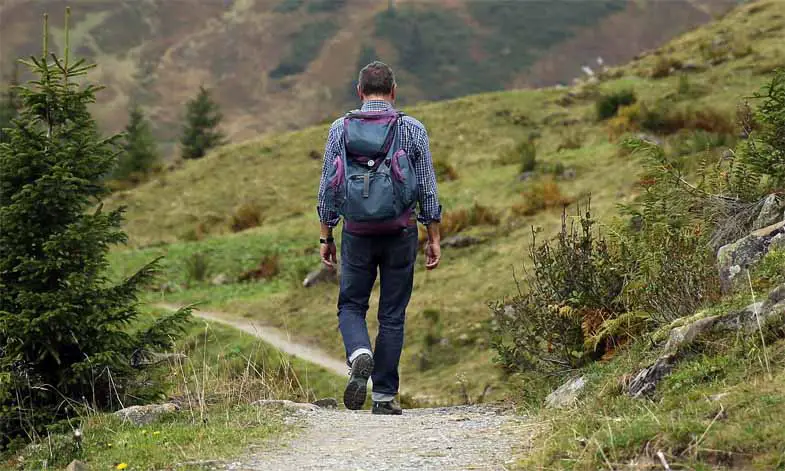
Most hiking trails have been in existence for ages and were routes for historical treasure caches and robberies.
With the right type of metal detector and patience, you are in for a big surprise.
The only complication with most hiking trails is that they are found in national parks controlled by the state and might have laws that prohibit metal detecting.
16. Fishing spots
Fishing spots have a massive gathering of people fishing for fun and lose all sorts of things including rings, coins, and jewelry.
Either way, the majority of metals you will come across while detecting in fishing spots are old hooks and bait cans.
The ideal time to go metal detecting at fishing spots is during off-season or when the number of people fishing has reduced.
17. Sidewalks
Due to the high pedestrian traffic, sidewalks are perfect places to find coins and jewelry.
Metal detecting is almost a harmless hobby, and that is why most states do not require you to have a permit.
However, if you live in a city where there is high pedestrian traffic, do not let this deter you from doing what you enjoy most.
Determine the ideal time when pedestrian traffic has reduced significantly to go hunting and be cautious if you dig in grass verges to avoid damaging water and gas lines.
18. College campuses

College students are very good at losing things.
If you manage to get permission to go treasure hunting around college or university campuses, then you have access to grounds full of lost jewelry lying around as students have a great love for fashion.
Concentrate your hunt around the library, cafeteria, around the hostels, and sorority sites.
19. Old garbage sites
If you are interested in ancient or old coins, rings, artifacts, and other metallic souvenirs, you might want to focus your metal detecting in old garbage sites.
However, you will have to be very discriminative as garbage sites are full of trash and metals that you might not be interested in.
There is a high probability that you might uncover valuable scrap metals such as brass, copper, and silver.
20. Garages and carports
Most cars are made from metal, and a lot of these metals are dismantled and fixed in garages and carports.
Most of the things you will find are target junk, such as nails, washers, nuts, and bolts.
However, if you are keen enough, you might stumble upon coins and other forms of valuable metal that fell from the pockets of mechanics and clients.
21. Hunting camps
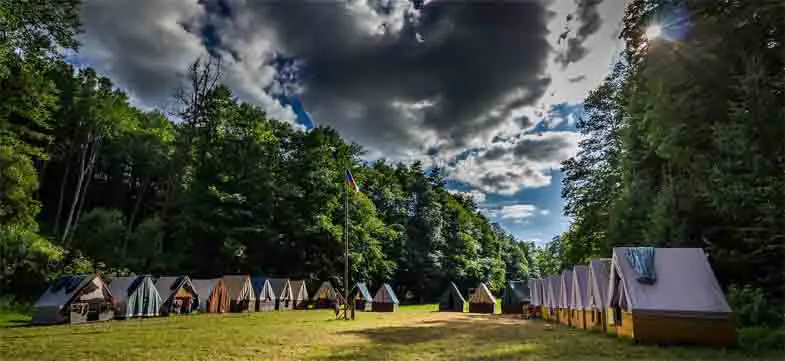
Hunters carry a lot of heavy gear when out there in their camps, and easily lose them or leave them behind.
If you take your time and follow their hunting trails as well, you might be lucky to uncover gun and bow parts and bullet shell casings.
Be sure to obtain permission first from private owners or any other relevant authority.
22. Old Tavern sites
Coins and jewelry are prevalent in taverns and bars. Metal detecting here will also require you to get permission from the owner of the premises.
If there was a motel nearby, then you should to be on the lookout for jewelry and other small metal souvenirs.
23. Waterfalls and along river banks
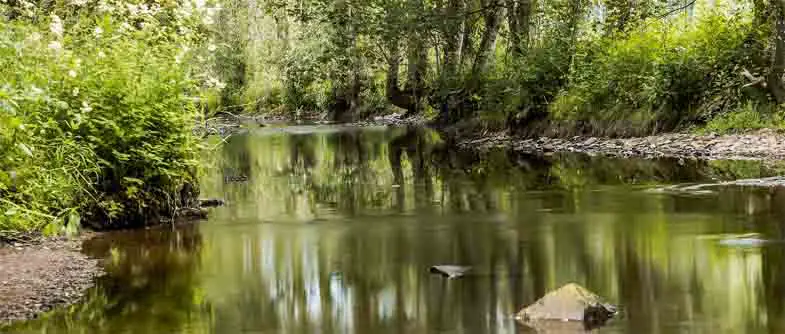
You cannot afford to miss out on metal detecting opportunities at plunge pools or along the banks of rivers.
The first reason why these are ideal locations to detect metal is that anything lost upstream may have been washed down by the waters.
Secondly, waterfalls offer scenic views and attract a lot of people who often lose coins, rings, and other forms of jewelry while enjoying what nature has to offer.
You may even find gold nuggets if the river in running through the right areas.
However, exercise lots of precaution as you do not want any accidents taking place.
24. Old sawmills
Getting permission to metal detect at old sawmills may not be as easy but are worthwhile if you are granted permission.
Most of these sawmills had camps where workers lived.
You may not be lucky enough to find lots of jewelry or coins, but you'll be sure to uncover artifacts, horseshoes, old tools, and relics.
25. Old military bases
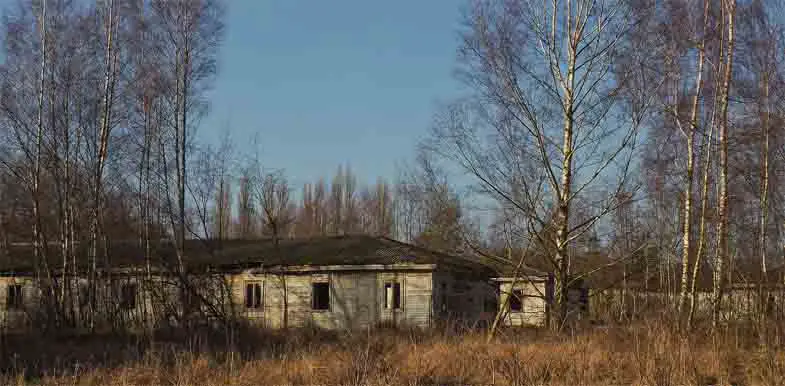
Most of these have been marked as historical sites, and the idea of getting permission to hunt for treasure is pretty far-fetched.
However, if you, by any chance, succeed, then you should be ready to uncover all kinds of valuables and hidden treasures.
Old military bases are hotspots for relics, artifacts, coins, bullet casing, and swords.
Return from 25 Best Places To Go Metal Detecting to Lost Treasure HQ.
